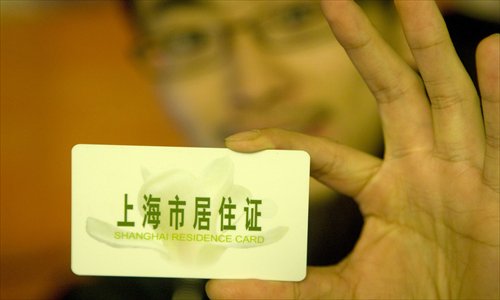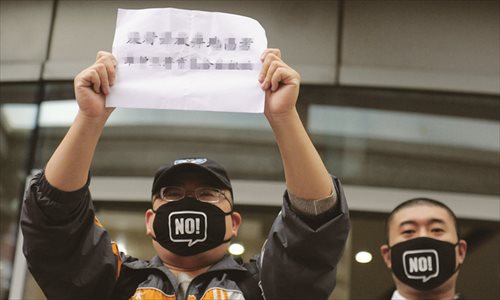Hacking at the hukou

A man displays his Shanghai residence card. For nonlocals, having a residency permit now means their children can attend the same schools as Shanghai children and enjoy many of the same welfare benefits. Photo: CFP
Shanghai has launched a new points-based residency permit system, in an effort to speed up the reformation of hukou (household registration) system, which is being pushed by the central government. For outsiders living in Shanghai, holding a residency permit means their children can go to the same schools as other citizens and enjoy many of the same welfare benefits.
Officials say the differences between migrants with a Shanghai residency permit and those with a Shanghai hukou will be minimal except for three main points. Permit holders cannot obtain permanent residence for their parents; they cannot apply for the city's welfare payments; and they cannot apply for government-subsidized low-cost housing, according to Mao Dali, the deputy director of the Shanghai Municipal Human Resources and Social Security Bureau.
The hukou system, which was introduced in 1958, divides Chinese people into rural and urban residents, and prevents people from rural areas who move to the cities being officially registered there or having access to the same education, health care and welfare benefits as city dwellers.
The purpose was to prevent farmers from leaving the land and thereby creating a crisis in agricultural production. The system virtually deprives people of the freedom of movement in China, and experts have long said that the reform of the hukou system is essential to achieving true urbanization in China.

A points system
Under the new residency permit regulations, which took effect this month, Shanghai residents who come from outside the city can apply for a residency permit if they accumulate 120 points calculated on factors that include age, education, professional skills and employment.
Weng Huajian, the chief economist of the Shanghai Municipal Development and Reform Commission, told a press conference introducing the new regulations last month, "Migrant workers will gradually enjoy the same basic public services as local residents. Those who make a contribution to Shanghai can earn points and the equivalent in public services."
Under the new system, education counts for a large number of points towards a permit. A bachelor's degree alone is worth 90 points and a doctoral degree counts for 110 points. As everyone under the age of 44 gets 30 points, all recent college graduates and those with a bachelor's degree or above will easily get the 120 points required.
Skilled workers can obtain up to 140 points if they have the right certificates or awards. Nonlocal residents in vital professions, those who invest in businesses in Shanghai and contribute to local employment, and those who work near shipping ports, can score extra points. Anyone married to a Shanghai person gets an additional 40 points.
However, anyone discovered faking application details will have 150 points deducted and anyone who has been convicted of a crime within the previous five years will have 50 points deducted for each offence.
Residency permit applications can be made at community service centers. If someone wants to increase the number of points they have been allocated, they should first apply to their employers who can then seek to have more points confirmed at district-level talent service centers.
Welfare improvement
To improve the welfare of migrants and to better serve and administer the floating population in the city, Shanghai introduced a temporary regulation in 2002 to attract skilled workers. It was the first city in China to introduce a residency permit policy.
In 2004, it expanded this to all migrants in Shanghai as long as they fulfilled basic requirements like being in employment and having accommodation. The policy corrected the previous problem that meant people could not work in Shanghai legally if they did not have a Shanghai hukou.
Before that Shanghai had three types of residency permits which differentiated the level of welfare benefits each were entitled to: type A were skilled workers or professionals from outside the city; type B were general employers or employees; and type C were students. Under these regulations, only the children of A residents could attend city high schools and sit the gaokao (college entrance exams) in Shanghai.
Since 2009 if a person has had a residency permit for over seven years, he or she is automatically entitled to a Shanghai hukou.
Ren Yuan, the deputy director of the Institute of Population Research at Fudan University, said, "The biggest improvement of the new points-based system is that it is more transparent and fair, and compared with the former system, people no longer need to meet all the requirements but can try to gain more points in areas where they have an advantage."
Weng Huajian also backed the new regulations. "The points-based evaluation will encourage migrants to raise their professional skills and contribute more to the city. More and more people will enjoy the city's public services and the city's fiscal spending will increase as well."
Education controversy
One of the most controversial benefits in the new system sees the children of residency permit holders being able to sit the zhongkao (high school entrance exams) and the gaokao in Shanghai.
"As people now having more than 120 points are expected to outnumber the holders of the old type A residency permits, the number of migrant students sitting high school and college entrance exams will increase next year for sure. The exact number is not yet known," Mao Dali said
Official figures show there are about 500,000 children of nonlocal residents in Shanghai. Zhao Dahai, an associate professor at the School of International and Public Affairs of Shanghai Jiao Tong University, estimates that about 50,000 will be able to attend local schools each year given the new policy.
"Among the 50,000 students, about 5,000 migrant students will be able to sit the zhongkao, and 3,000 migrant students will sit the gaokao each year thanks to the new policy," he said. This year, 80,600 students took part in the zhongkao and 78,800 students took part in the gaokao in Shanghai.
But this has upset many city folk who are worried that nonlocal children will take up too many resources and increase competition.
On Sina Weibo and online sites popular with Shanghai people, people have been discussing the new policy. One netizen called Du Chonghui said on Sina Weibo, "More people will flood into Shanghai to enjoy the city's education resources here and take the zhongkao and gaokao here. This means Shanghai will have to invest more in education and children's hospitals, which are already inadequate. And there will be lots of other problems." His comments were supported by scores of others.
For experts, however, these concerns are unimportant. "The increase of immigrants will certainly take some of the educational resources of local Shanghai people. But this trend is irreversible. Migrants have contributed to Shanghai's economic development and it's fair that they enjoy the same educational resources as the locals," Zhao said.
Ren Yuan said, "Instead of worrying about migrants occupying their resources, Shanghai people should hope that there will be more colleges and education opportunities in Shanghai. Migrants, if anything, can only boost the vitality and diversity of Shanghai's education."
Fairness questioned
While Shanghai folk have been worrying about their resources, some nonlocal residents are questioning the fairness of the new policies. Zhan Haite is a 16-year-old activist who has been fighting for the right for migrant children to take zhongkao and gaokao in Shanghai.
She told the Global Times that it's disappointing for some nonlocal families who had been hoping that the new policy would really make a difference. "According to the new policy, whether migrant children can sit the gaokao in Shanghai depends entirely upon their parents. This is what we call 'pindie' where a person depends on the status and influence of their parents."
Zhan's dad has fathered three children. Having violated the one-child policy, Zhan's family belongs to the type of people who are least welcomed by Shanghai under the new policy - people who will be kept outside the residency permit system regardless of how many points they can accumulate.
And many ordinary workers haven't heard of the new policies. Ran Xiuyun, a 40-year-old woman from Sichuan Province, has been working in Shanghai for over 10 years as a laundry worker and part-time ayi. "I only have a temporary residency permit. The requirements for a residency permit are very strict for me and most of my friends in Shanghai don't have one. Nor do we want to fight for it."
Zhao believes that the policies will take time to become effective. "In the long run, all children should enjoy the same education rights. But we can't rush. Any push to radically change or abolish the hukou system would undermine the quality of Shanghai's public services. Reform takes time."